Unit 6 Electricity everywhere Section 2 Grammar 课件 沪教版七年级下册
文档属性
| 名称 | Unit 6 Electricity everywhere Section 2 Grammar 课件 沪教版七年级下册 |  | |
| 格式 | pptx | ||
| 文件大小 | 12.3MB | ||
| 资源类型 | 试卷 | ||
| 版本资源 | 沪教版 | ||
| 科目 | 英语 | ||
| 更新时间 | 2025-02-28 19:38:29 | ||
图片预览

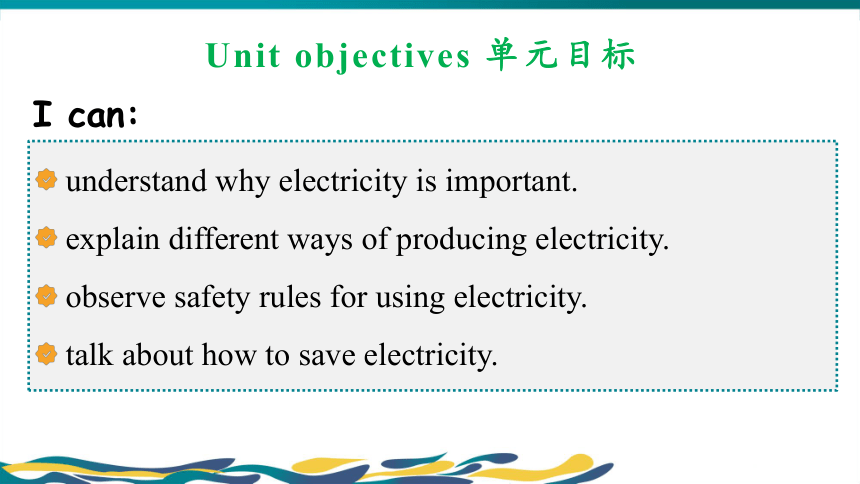
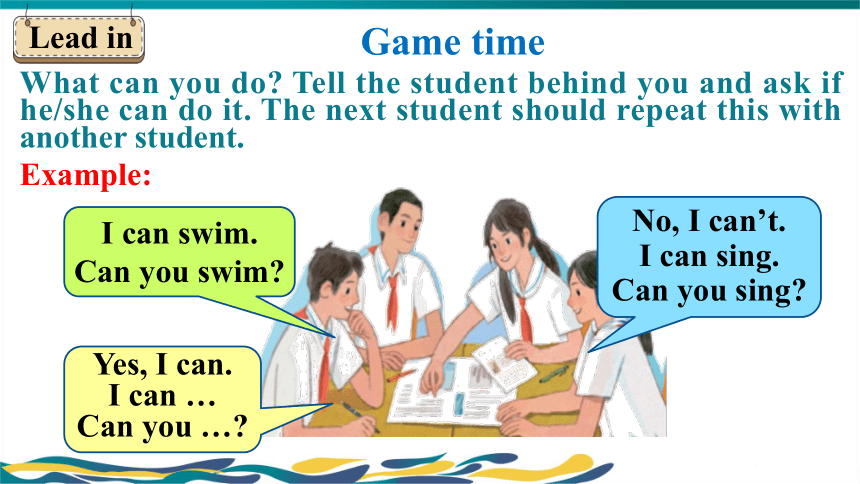
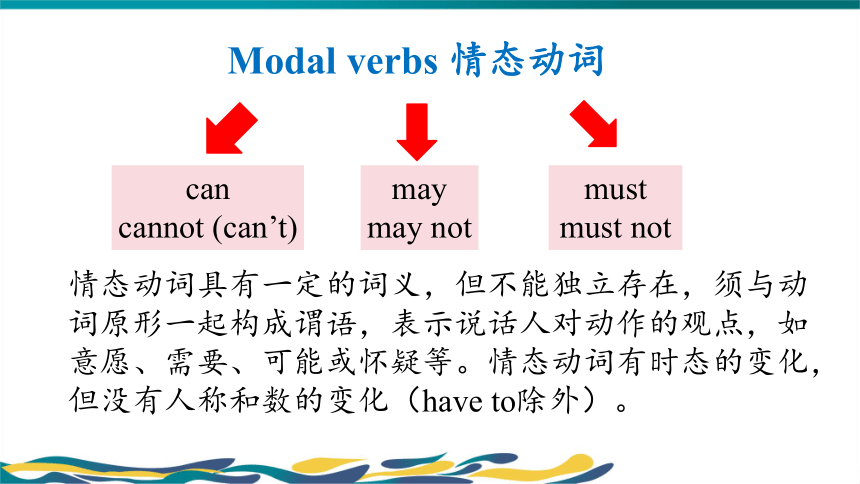
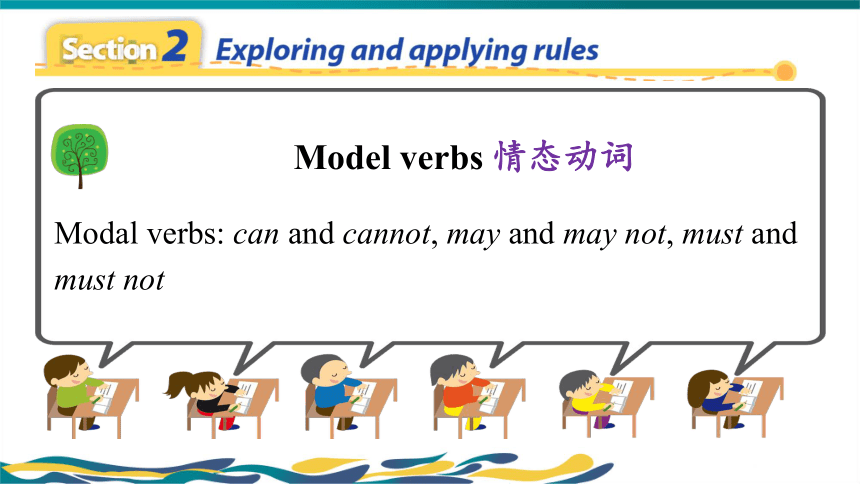
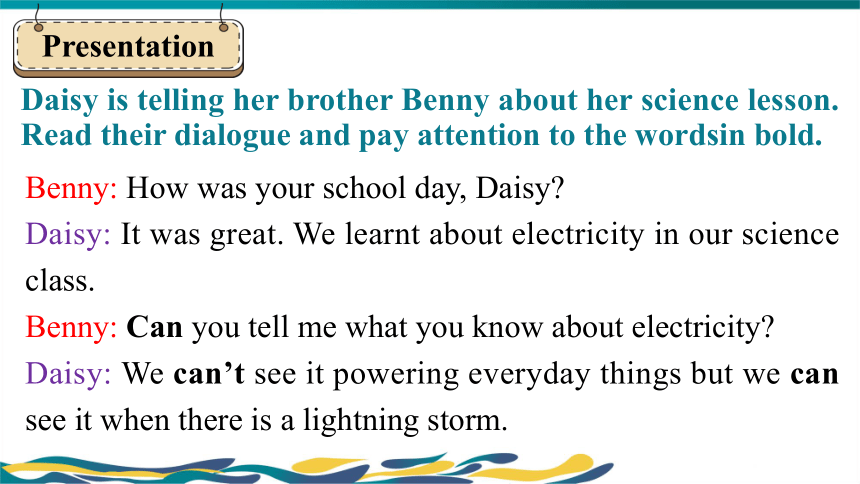
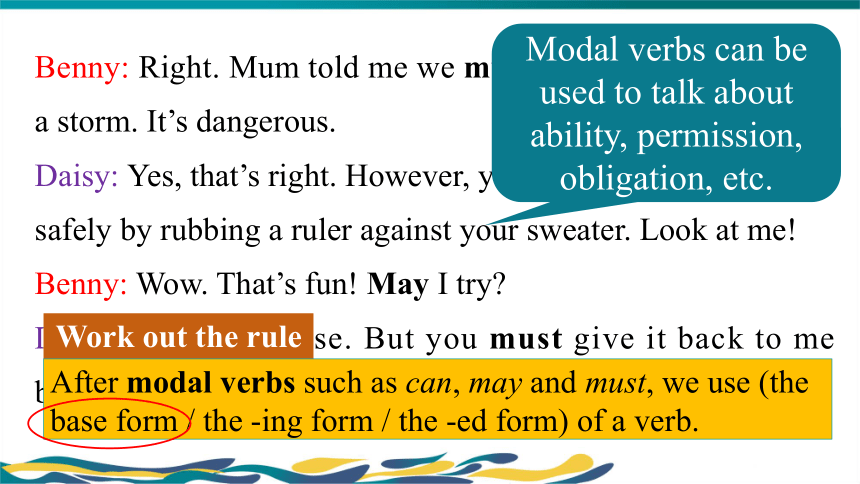
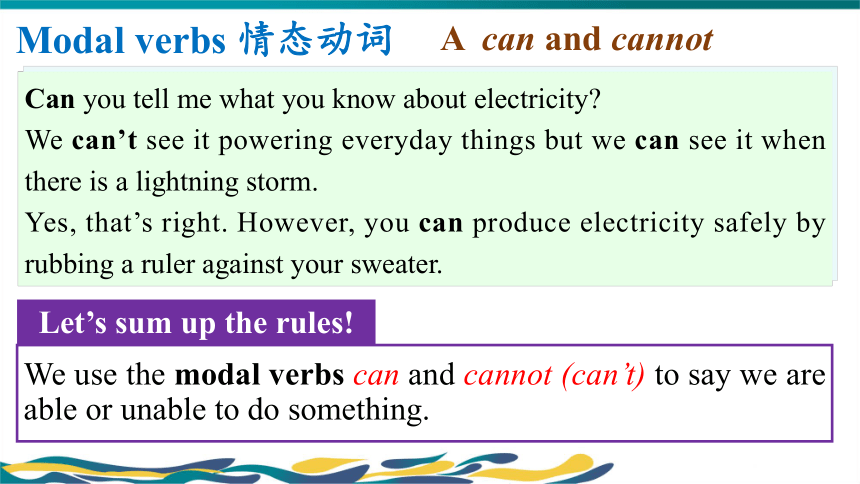
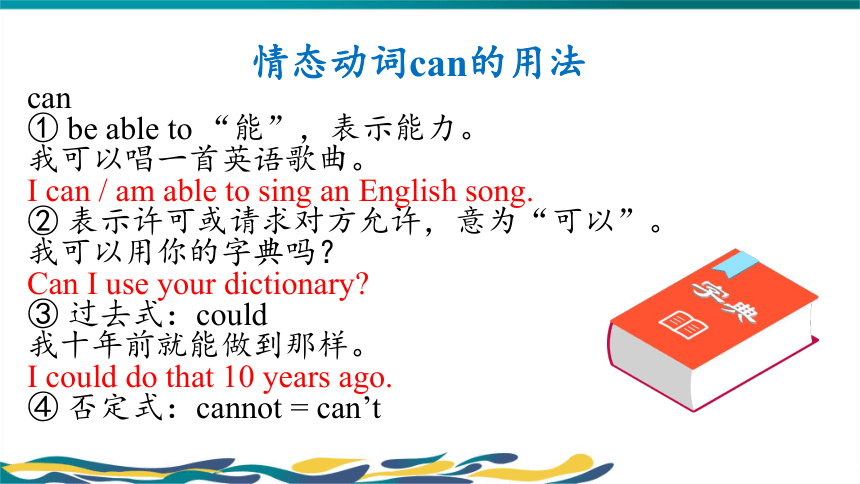
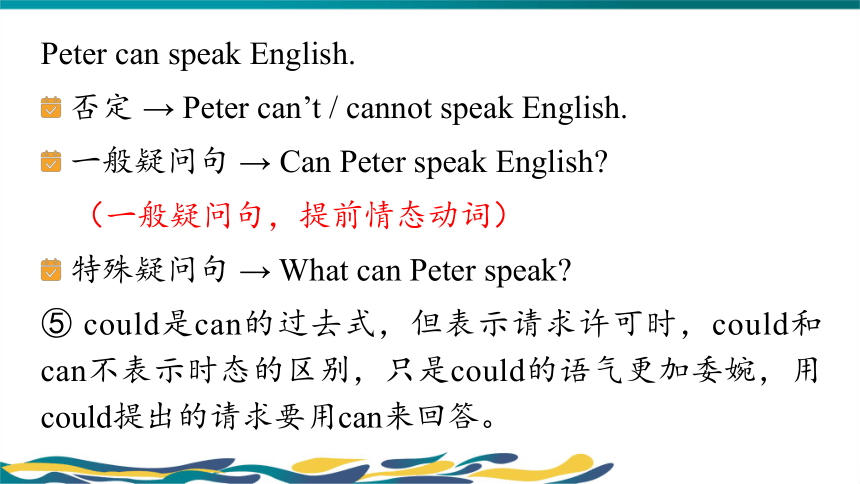
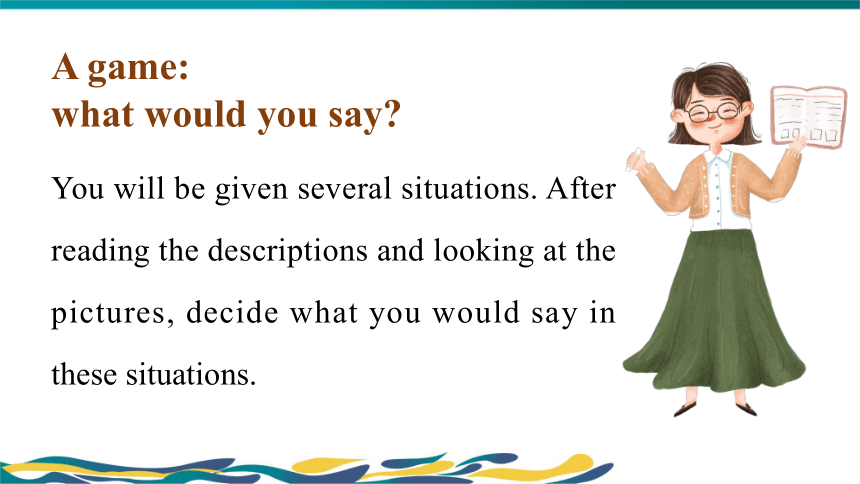
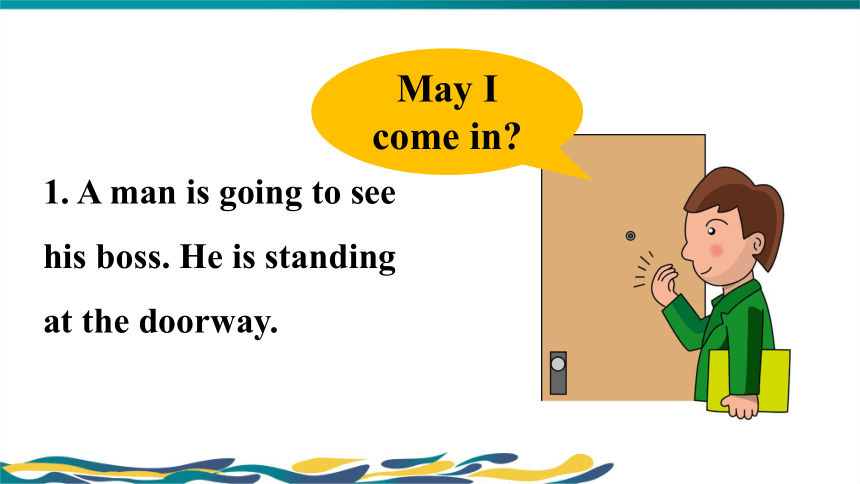
文档简介
(共37张PPT)
Unit 6 Electricity everywhere
主题范畴:
人与自然;人与社会
主题群:
环境保护;科学与技术
子主题:
环境污染及原因,环保意识和行为;科学技术与工程,人类发明与创造
Key question
What role does electricity play in our daily lives
understand why electricity is important.
explain different ways of producing electricity.
observe safety rules for using electricity.
talk about how to save electricity.
Unit objectives 单元目标
I can:
Lead in
Game time
What can you do Tell the student behind you and ask if he/she can do it. The next student should repeat this with another student.
Example:
No, I can’t.
I can sing.
Can you sing
Yes, I can.
I can …
Can you …
I can swim. Can you swim
Modal verbs 情态动词
can
cannot (can’t)
may
may not
must
must not
情态动词具有一定的词义,但不能独立存在,须与动词原形一起构成谓语,表示说话人对动作的观点,如意愿、需要、可能或怀疑等。情态动词有时态的变化,但没有人称和数的变化(have to除外)。
Model verbs 情态动词
Modal verbs: can and cannot, may and may not, must and
must not
Presentation
Daisy is telling her brother Benny about her science lesson. Read their dialogue and pay attention to the wordsin bold.
Benny: How was your school day, Daisy
Daisy: It was great. We learnt about electricity in our science class.
Benny: Can you tell me what you know about electricity
Daisy: We can’t see it powering everyday things but we can see it when there is a lightning storm.
Benny: Right. Mum told me we mustn’t go outdoors during a storm. It’s dangerous.
Daisy: Yes, that’s right. However, you can produce electricity safely by rubbing a ruler against your sweater. Look at me!
Benny: Wow. That’s fun! May I try
Daisy: Yes, of course. But you must give it back to me because it’s my favourite ruler!
Modal verbs can be used to talk about ability, permission, obligation, etc.
Work out the rule
After modal verbs such as can, may and must, we use (the base form / the -ing form / the -ed form) of a verb.
A can and cannot
Can you tell me what you know about electricity
We can’t see it powering everyday things but we can see it when there is a lightning storm.
Yes, that’s right. However, you can produce electricity safely by rubbing a ruler against your sweater.
Modal verbs 情态动词
We use the modal verbs can and cannot (can’t) to say we are able or unable to do something.
Let’s sum up the rules!
情态动词can的用法
can
① be able to “能”,表示能力。
我可以唱一首英语歌曲。
I can / am able to sing an English song.
② 表示许可或请求对方允许,意为“可以”。
我可以用你的字典吗?
Can I use your dictionary
③ 过去式:could
我十年前就能做到那样。
I could do that 10 years ago.
④ 否定式:cannot = can’t
Peter can speak English.
否定 → Peter can’t / cannot speak English.
一般疑问句 → Can Peter speak English
(一般疑问句,提前情态动词)
特殊疑问句 → What can Peter speak
⑤ could是can的过去式,但表示请求许可时,could和can不表示时态的区别,只是could的语气更加委婉,用could提出的请求要用can来回答。
A game:
what would you say
You will be given several situations. After reading the descriptions and looking at the pictures, decide what you would say in these situations.
1. A man is going to see his boss. He is standing at the doorway.
May I come in
2. A student is going to ask the teacher a question.
May I ask you a question
3. A boy is thirsty. He is asking his mother for something.
May I have some water
4. A shop assistant is serving a customer.
May I help you
Wow. That’s fun! May I try
Yes, of course. But you must give it back to me because it’s my favourite ruler!
You may / can turn on the TV.
You may not / cannot play in the kitchen.
B may and may not
We use may and may not to ask for, give and refuse permission. In less formal situations, some people like to use can and cannot (can’t) for the same purpose.
Let’s sum up the rules!
情态动词may的用法
may
① 表示允许may表示许可或请求对方允许,意为“可以”,相当于can。两者的区别在于:表示请求许可时,may更能表示礼貌或敬意。
—— 外婆,我现在可以看电视吗?
—— 不,你不可以。
— May I watch TV now, grandma
— No, you may not.
②否定式: may not意为“不可以”。
③may构成的一般疑问句及其回答形式如下:
May I ...
(肯定回答)Yes, you may / can.
(否定回答)No, you may not / can’t /mustn’t.
(注:mustn’t的语气最强,表示禁止)
Daisy is not feeling well today. Benny is at home with her. Read their conversation below. Fill in the blanks with may or can.
Benny: How are you feeling, Daisy
Daisy: Not very well.
Benny: (1)_________ I get you a chair
Daisy: Yes, thanks.
Benny: I’m going out. (2)_______ I borrow your bicycle,
Daisy
Daisy: Yes, you may. Before you go to meet your friends,
can you come and see the doctor with me
Benny: Yes. I (3)_____. (4)______ I carry your bag for you
Daisy: Yes, that’s very kind of you, Benny. I’m ready to
go. (5)____ you open the door for me
Benny: Yes, I can.
Daisy: Thanks.
May
May
can
Can
May / Can
What do these signs mean
(You mustn’t smoke here.)
(You mustn’t climb this ladder.)
(You mustn’t swim here.)
(You mustn’t use your mobile
phone here.)
Mum told me we mustn’t go outdoors during a storm.
But you must give it back to me because it’s my favourite ruler!
C must and must not
We use must and must not / mustn’t to tell people what to do or what not to do.
Let’s sum up the rules!
must
① 表示规定、命令、强制,意为“必须;一定”。
如:
你必须先做作业。
You must do your homework first.
你不许在这里吸烟。
You mustn’t smoke here.
情态动词must的用法
② must的否定式为must not / mustn’t,意为
“禁止;不准”。
③ must构成的一般疑问句及其回答形式如下:
Must I ...
(肯定回答)Yes, you must.
(否定回答)No, you needn’t.
④ 辨析must和have to
意义 用法
must “必须;一定” 强调客观上必须做某事
have to “不得不;必须” 强调主观上不得不做某事
I must drink more water.
______________________________
______________________________
I must not _____________________
______________________________
______________________________
I must go to bed early.
I must take the medicine on time.
eat cold food.
I must not go out alone.
I must not share cups with others.
Daisy saw a doctor. The doctor told her what to do and what not to do. Help her write down the doctor’s instructions.
drink more water go to bed early
eat cold food share cups with others
go out alone take the medicine on time
Daisy got a robot for her birthday. Complete the conversation with can, can’t / cannot, may, may not, must, mustn’t / must not.
Practice
Daisy: Thank you, Dad. It is the best gift in the world!
Dad: You (1) _______ name your robot now.
Daisy: I think I’ll call him “Bobo”.
Dad: That’s a good name.
Daisy: How (2) _______ I turn him on
Dad: First you have to put the batteries inside here. Then you (3) _______ switch it on. Now you (4) _______ talk with “Bobo”.
can/may
can
can/may
can/may
Bobo: Hello. Please give me a name.
Daisy: Hello. I’ll name you “Bobo”.
Bobo: I love my name, thank you.
Dad: Bobo, please tell us what you (5) _______ do.
Bobo: I (6) _______ dance and sing and play football. I
(7) _______ play chess and I (8)_______ speak Chinese, English and French.
Daisy: Wow! You (9) _______ help me with my homework then.
can
can
can
can
can
Bobo: If you have questions, you (10) _______ ask me. But you (11) _______ do your homework yourself.
Daisy: OK. I’ll go swimming in the afternoon. (12) _______ you come with me
Bobo: Sorry. I (13) ___________ swim. I (14) _______ stay away from water. If I get wet, I’ll become ill and won’t work anymore. So you (15) ________________ put me in the water.
Dad: Daisy, here are the instructions for “Bobo”. You (16) _______ read them very carefully and find out what you can and (17) __________ do.
Bobo: Let me read them out for you, master. ...
may/can
must
can
cannot/can’t
must
must not/ mustn’t/cannot/can’t
must
cannot/can’t
Imagine you are Daisy. Your little brother Benny is going to primary school in the new term. You are telling him some dos and don’ts about school life. Write them down.
Dos
(1) ______________________________________________
(2) ______________________________________________
(3) ______________________________________________
(4) ______________________________________________
(5) ______________________________________________
You must be polite to your classmates and teachers.
Don’ts
(1) ______________________________________________
(2) ______________________________________________
(3) ______________________________________________
(4) ______________________________________________
(5) ______________________________________________
You mustn’t eat in class.
情态动词后接动词 ______,没有人称和数的变化, _________(能 / 不能)单独作谓语,要与后面的______ 共同作谓语。其否定形式是在其后面直接加 ______。
情态动词can的用法:表示能力。构成一般疑问句时,需把can移到 ______(句首 / 中)。肯定回答为“Yes, 主语+ ______”;否定回答为“No, 主语+ ____________”。
not
原形
不能
动词
句首
can
can’t / cannot
Summary
情态动词may的用法:表示允许。may在表达这个意思时可以与can互换使用。由may引起的一般疑问句,其否定回答用_________,___________ 或 ________ 。
表示请求时,could和can不表示时态的区别,只是could的语气更加委婉。
情态动词must的用法:表示必须 / 一定。其否定形式mustn’t表示______。由must引起的一般疑问句,其否定回答要用______。
may not
can’t / cannot
mustn’t
禁止
needn’t
一、用本单元所学的情态动词填空。
1. — Kate, you have won the English competition!
— Oh, it _______ be true. I made a lot of mistakes in it.
2. You ________ talk to your grandparents like that.
It’s impolite.
3. We _______ wash our hands before meals.
It is good for our health.
4. Excuse me, ____ you tell me the way to the nearest park
5. You ________ go with us to the zoo if you want to.
can’t
mustn’t
must
can
can / may
二、选择最佳答案填空。
( )1. If you feel tired, you ____ sit on this chair and have a
rest.
A. must B. can C. need D. can’t
( )2. — ____ I watch TV now, Mum I finished my
homework.
— Yes, you ____.
A. Must, need B. May, can
C. Need, need D. May, must
B
B
( )3. He ____ see the words on the blackboard
because he sits far away.
A. mustn’t B. shouldn’t
C. can’t D. needn’t
( )4. — ____ I do all the housework now
— No, you ____. You can do it later.
A. Must, mustn’t B. Must, can’t
C. Must, may not D. Must, needn’t
D
C
Thank you!
Unit 6 Electricity everywhere
主题范畴:
人与自然;人与社会
主题群:
环境保护;科学与技术
子主题:
环境污染及原因,环保意识和行为;科学技术与工程,人类发明与创造
Key question
What role does electricity play in our daily lives
understand why electricity is important.
explain different ways of producing electricity.
observe safety rules for using electricity.
talk about how to save electricity.
Unit objectives 单元目标
I can:
Lead in
Game time
What can you do Tell the student behind you and ask if he/she can do it. The next student should repeat this with another student.
Example:
No, I can’t.
I can sing.
Can you sing
Yes, I can.
I can …
Can you …
I can swim. Can you swim
Modal verbs 情态动词
can
cannot (can’t)
may
may not
must
must not
情态动词具有一定的词义,但不能独立存在,须与动词原形一起构成谓语,表示说话人对动作的观点,如意愿、需要、可能或怀疑等。情态动词有时态的变化,但没有人称和数的变化(have to除外)。
Model verbs 情态动词
Modal verbs: can and cannot, may and may not, must and
must not
Presentation
Daisy is telling her brother Benny about her science lesson. Read their dialogue and pay attention to the wordsin bold.
Benny: How was your school day, Daisy
Daisy: It was great. We learnt about electricity in our science class.
Benny: Can you tell me what you know about electricity
Daisy: We can’t see it powering everyday things but we can see it when there is a lightning storm.
Benny: Right. Mum told me we mustn’t go outdoors during a storm. It’s dangerous.
Daisy: Yes, that’s right. However, you can produce electricity safely by rubbing a ruler against your sweater. Look at me!
Benny: Wow. That’s fun! May I try
Daisy: Yes, of course. But you must give it back to me because it’s my favourite ruler!
Modal verbs can be used to talk about ability, permission, obligation, etc.
Work out the rule
After modal verbs such as can, may and must, we use (the base form / the -ing form / the -ed form) of a verb.
A can and cannot
Can you tell me what you know about electricity
We can’t see it powering everyday things but we can see it when there is a lightning storm.
Yes, that’s right. However, you can produce electricity safely by rubbing a ruler against your sweater.
Modal verbs 情态动词
We use the modal verbs can and cannot (can’t) to say we are able or unable to do something.
Let’s sum up the rules!
情态动词can的用法
can
① be able to “能”,表示能力。
我可以唱一首英语歌曲。
I can / am able to sing an English song.
② 表示许可或请求对方允许,意为“可以”。
我可以用你的字典吗?
Can I use your dictionary
③ 过去式:could
我十年前就能做到那样。
I could do that 10 years ago.
④ 否定式:cannot = can’t
Peter can speak English.
否定 → Peter can’t / cannot speak English.
一般疑问句 → Can Peter speak English
(一般疑问句,提前情态动词)
特殊疑问句 → What can Peter speak
⑤ could是can的过去式,但表示请求许可时,could和can不表示时态的区别,只是could的语气更加委婉,用could提出的请求要用can来回答。
A game:
what would you say
You will be given several situations. After reading the descriptions and looking at the pictures, decide what you would say in these situations.
1. A man is going to see his boss. He is standing at the doorway.
May I come in
2. A student is going to ask the teacher a question.
May I ask you a question
3. A boy is thirsty. He is asking his mother for something.
May I have some water
4. A shop assistant is serving a customer.
May I help you
Wow. That’s fun! May I try
Yes, of course. But you must give it back to me because it’s my favourite ruler!
You may / can turn on the TV.
You may not / cannot play in the kitchen.
B may and may not
We use may and may not to ask for, give and refuse permission. In less formal situations, some people like to use can and cannot (can’t) for the same purpose.
Let’s sum up the rules!
情态动词may的用法
may
① 表示允许may表示许可或请求对方允许,意为“可以”,相当于can。两者的区别在于:表示请求许可时,may更能表示礼貌或敬意。
—— 外婆,我现在可以看电视吗?
—— 不,你不可以。
— May I watch TV now, grandma
— No, you may not.
②否定式: may not意为“不可以”。
③may构成的一般疑问句及其回答形式如下:
May I ...
(肯定回答)Yes, you may / can.
(否定回答)No, you may not / can’t /mustn’t.
(注:mustn’t的语气最强,表示禁止)
Daisy is not feeling well today. Benny is at home with her. Read their conversation below. Fill in the blanks with may or can.
Benny: How are you feeling, Daisy
Daisy: Not very well.
Benny: (1)_________ I get you a chair
Daisy: Yes, thanks.
Benny: I’m going out. (2)_______ I borrow your bicycle,
Daisy
Daisy: Yes, you may. Before you go to meet your friends,
can you come and see the doctor with me
Benny: Yes. I (3)_____. (4)______ I carry your bag for you
Daisy: Yes, that’s very kind of you, Benny. I’m ready to
go. (5)____ you open the door for me
Benny: Yes, I can.
Daisy: Thanks.
May
May
can
Can
May / Can
What do these signs mean
(You mustn’t smoke here.)
(You mustn’t climb this ladder.)
(You mustn’t swim here.)
(You mustn’t use your mobile
phone here.)
Mum told me we mustn’t go outdoors during a storm.
But you must give it back to me because it’s my favourite ruler!
C must and must not
We use must and must not / mustn’t to tell people what to do or what not to do.
Let’s sum up the rules!
must
① 表示规定、命令、强制,意为“必须;一定”。
如:
你必须先做作业。
You must do your homework first.
你不许在这里吸烟。
You mustn’t smoke here.
情态动词must的用法
② must的否定式为must not / mustn’t,意为
“禁止;不准”。
③ must构成的一般疑问句及其回答形式如下:
Must I ...
(肯定回答)Yes, you must.
(否定回答)No, you needn’t.
④ 辨析must和have to
意义 用法
must “必须;一定” 强调客观上必须做某事
have to “不得不;必须” 强调主观上不得不做某事
I must drink more water.
______________________________
______________________________
I must not _____________________
______________________________
______________________________
I must go to bed early.
I must take the medicine on time.
eat cold food.
I must not go out alone.
I must not share cups with others.
Daisy saw a doctor. The doctor told her what to do and what not to do. Help her write down the doctor’s instructions.
drink more water go to bed early
eat cold food share cups with others
go out alone take the medicine on time
Daisy got a robot for her birthday. Complete the conversation with can, can’t / cannot, may, may not, must, mustn’t / must not.
Practice
Daisy: Thank you, Dad. It is the best gift in the world!
Dad: You (1) _______ name your robot now.
Daisy: I think I’ll call him “Bobo”.
Dad: That’s a good name.
Daisy: How (2) _______ I turn him on
Dad: First you have to put the batteries inside here. Then you (3) _______ switch it on. Now you (4) _______ talk with “Bobo”.
can/may
can
can/may
can/may
Bobo: Hello. Please give me a name.
Daisy: Hello. I’ll name you “Bobo”.
Bobo: I love my name, thank you.
Dad: Bobo, please tell us what you (5) _______ do.
Bobo: I (6) _______ dance and sing and play football. I
(7) _______ play chess and I (8)_______ speak Chinese, English and French.
Daisy: Wow! You (9) _______ help me with my homework then.
can
can
can
can
can
Bobo: If you have questions, you (10) _______ ask me. But you (11) _______ do your homework yourself.
Daisy: OK. I’ll go swimming in the afternoon. (12) _______ you come with me
Bobo: Sorry. I (13) ___________ swim. I (14) _______ stay away from water. If I get wet, I’ll become ill and won’t work anymore. So you (15) ________________ put me in the water.
Dad: Daisy, here are the instructions for “Bobo”. You (16) _______ read them very carefully and find out what you can and (17) __________ do.
Bobo: Let me read them out for you, master. ...
may/can
must
can
cannot/can’t
must
must not/ mustn’t/cannot/can’t
must
cannot/can’t
Imagine you are Daisy. Your little brother Benny is going to primary school in the new term. You are telling him some dos and don’ts about school life. Write them down.
Dos
(1) ______________________________________________
(2) ______________________________________________
(3) ______________________________________________
(4) ______________________________________________
(5) ______________________________________________
You must be polite to your classmates and teachers.
Don’ts
(1) ______________________________________________
(2) ______________________________________________
(3) ______________________________________________
(4) ______________________________________________
(5) ______________________________________________
You mustn’t eat in class.
情态动词后接动词 ______,没有人称和数的变化, _________(能 / 不能)单独作谓语,要与后面的______ 共同作谓语。其否定形式是在其后面直接加 ______。
情态动词can的用法:表示能力。构成一般疑问句时,需把can移到 ______(句首 / 中)。肯定回答为“Yes, 主语+ ______”;否定回答为“No, 主语+ ____________”。
not
原形
不能
动词
句首
can
can’t / cannot
Summary
情态动词may的用法:表示允许。may在表达这个意思时可以与can互换使用。由may引起的一般疑问句,其否定回答用_________,___________ 或 ________ 。
表示请求时,could和can不表示时态的区别,只是could的语气更加委婉。
情态动词must的用法:表示必须 / 一定。其否定形式mustn’t表示______。由must引起的一般疑问句,其否定回答要用______。
may not
can’t / cannot
mustn’t
禁止
needn’t
一、用本单元所学的情态动词填空。
1. — Kate, you have won the English competition!
— Oh, it _______ be true. I made a lot of mistakes in it.
2. You ________ talk to your grandparents like that.
It’s impolite.
3. We _______ wash our hands before meals.
It is good for our health.
4. Excuse me, ____ you tell me the way to the nearest park
5. You ________ go with us to the zoo if you want to.
can’t
mustn’t
must
can
can / may
二、选择最佳答案填空。
( )1. If you feel tired, you ____ sit on this chair and have a
rest.
A. must B. can C. need D. can’t
( )2. — ____ I watch TV now, Mum I finished my
homework.
— Yes, you ____.
A. Must, need B. May, can
C. Need, need D. May, must
B
B
( )3. He ____ see the words on the blackboard
because he sits far away.
A. mustn’t B. shouldn’t
C. can’t D. needn’t
( )4. — ____ I do all the housework now
— No, you ____. You can do it later.
A. Must, mustn’t B. Must, can’t
C. Must, may not D. Must, needn’t
D
C
Thank you!
同课章节目录
